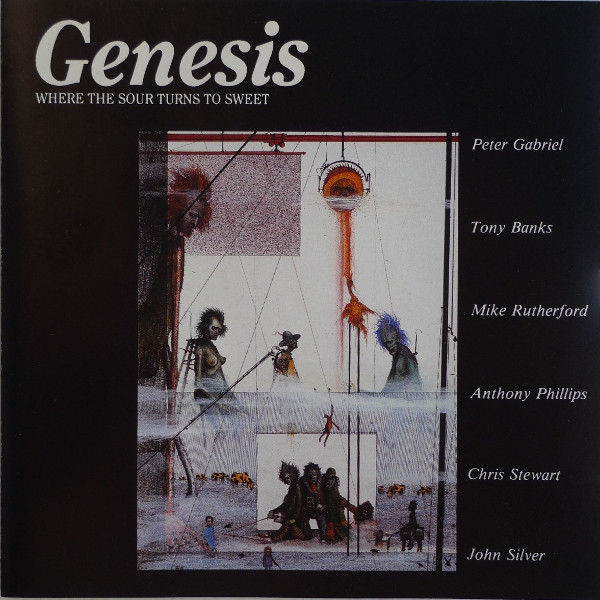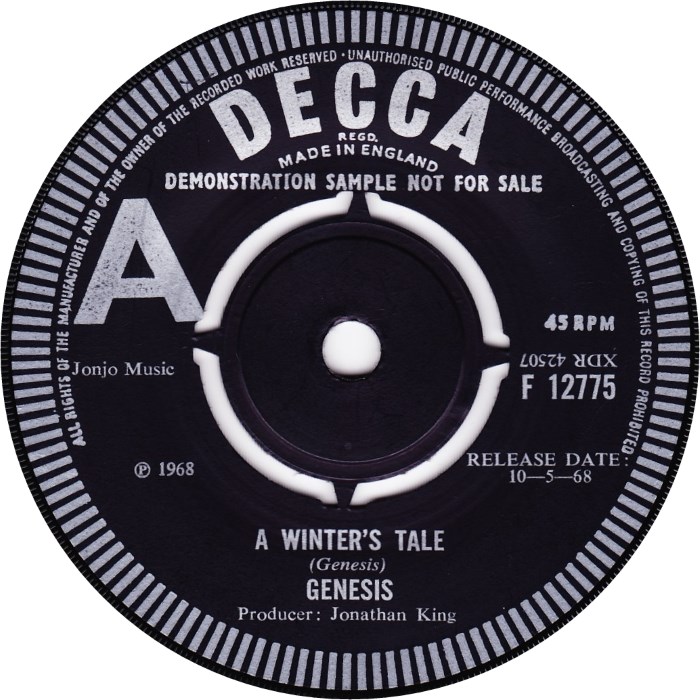In June 1969, Genesis released their third and final single for Decca Records: “Where the Sour Turns to Sweet” backed with “In Hiding.” It was intended to spark interest in their debut LP From Genesis to Revelation, but like its predecessors, it went largely unnoticed.
From Genesis to Revelation
By this point, Genesis had already released two singles on Decca: “The Silent Sun” and “A Winter’s Tale,” both in 1968 and both produced by Jonathan King. King also produced the band’s first full-length album, From Genesis to Revelation. The lineup at the time featured Tony Banks (keyboards), Peter Gabriel (vocals), Anthony Phillips (guitar), Mike Rutherford (guitar/bass), and John Silver (drums).
The album, loosely a concept work about the history of mankind, was still musically rooted in soft pop rather than progressive rock. Much to the band’s dismay, King added string arrangements to many tracks, softening the overall sound and steering it further from the band’s original vision.
Like the singles before it, the album failed to attract significant attention. In an effort to salvage interest, Decca decided to release a third single from the LP: “Where the Sour Turns to Sweet.”
Where the Sour Turns to Sweet
The track had actually been part of Genesis’s live repertoire for a while. Back in 1967, they recorded it, along with three other songs, during a one-hour session at Regent Sound Studios in London (where many rock legends had also worked). Jonathan King brought the young band in to record a demo, which was then sent to Decca. The label was impressed, and the band was signed.
They attempted to re-record “Where the Sour Turns to Sweet” at Advision Studios as their debut single, but the session was a disaster. Inexperience on both the band’s and producer’s parts led to the idea being shelved. Instead, “The Silent Sun” and “A Winter’s Tale” were released the following year, along with the full album in 1969.
Finally, on June 27, 1969, “Where the Sour Turns to Sweet” was released as a single (using the album version) with “In Hiding” as the B-side. It became Genesis’s third and last Decca single. Like the others, it failed to chart. There were even plans to release a remixed version of “In the Beginning” as a fourth single, but they never materialized.
Musical Highlights
“Where the Sour Turns to Sweet” opens with a bluesy piano phrase and finger snaps, giving it a laid-back, jazzy feel. Unfortunately, Arthur Greenslade’s added strings somewhat obscure the song’s raw energy. Peter Gabriel’s voice, even at this early stage, stands ou. His playful delivery and dynamic phrasing give the lyrics character and charm. It’s arguably one of the album’s standout tracks, though the fade-out feels abrupt and slightly uninspired.
Tony Banks and Tony Blackburn
Keyboardist Tony Banks once recalled being sent out to accost BBC DJ Tony Blackburn on the street to persuade him to play the single on his radio show (though Mike Rutherford claims that this was done when “A Winter’s Tale” was released.) “I told him, ‘Well, don’t play the A-side—play the B-side,’” Banks later said, referring to “In Hiding.” The situation was awkward for everyone involved, but the band was desperate enough to take the chance.
The End of the King Era
By the end of 1969, after three underwhelming singles and an album that missed the mark, Genesis was ready to move on. Jonathan King had taken the group as far as he could. The band withdrew to the countryside to reflect and write new music that would take them in a very different, much more adventurous direction.
Still, King left them with one important legacy: the name Genesis.



